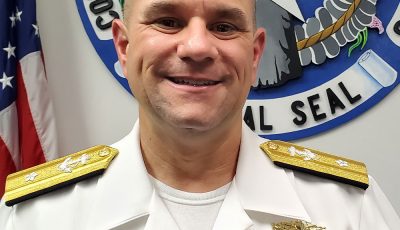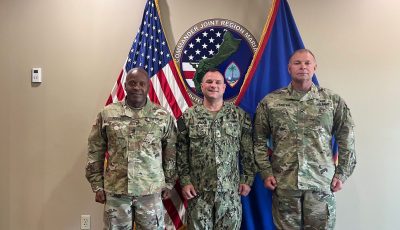Service to a larger ideal
Editor’s Note: The author is the keynote speaker at the Memorial Day ceremony this year.
Thank you for inviting me to speak today and to join with you—my brothers and sisters of the Mariana Islands—in commemorating Memorial Day.
I am extremely honored to be here with you as we celebrate our service members, their families, and all of those who stand and fight in the face of adversity so together we may have a better life.
Today we especially remember those heroes who sacrificed their own lives for the preservation of freedom and liberty.
Sacrifice is what we are commemorating today.
Our nation was founded on a very simple but very radical idea…that all humans were created equal and endowed by their creator with certain inalienable rights. As a nation, we have struggled—often mightily—to fully realize this principle.
Yet imperfect as we have been as a nation toward these goals through the years, with each young man or woman who dedicates their lives to the preservation of this ideal we inch closer to the nation we aspire to become.
Sacrifice is heroic when done in the service of an ideal bigger than ourselves. The heroes we commemorate today not only sacrificed their lives, but also sacrificed the lives they could have lived.
Harry O’Neal was a highly touted three-sport athlete coming out of Gettysburg College in 1939. While he excelled at football and basketball, baseball was O’Neal’s passion. On the day of O’Neal’s graduation, future baseball Hall of Famer and manager of the then Philadelphia Athletics, Conny Mack, came calling at O’Neal’s home. Mack signed the 6-foot-3-inch 239-lb catcher to a contract that would pay him $290 a month.
O’Neal started that season as the Athletics’ third string catcher relegated to the bullpen, warming up the pitchers. Despite his immense physical talent, O’Neal never had the opportunity to play in a Major League Baseball game until late summer. In the twilight hours of July 23, 1939, O’Neal’s dreams of playing in a Major League game came true, when he was inserted into a game in the final two innings in a lopsided loss between the A’s and the Detroit Tigers. O’Neal would never again be called into a major league game.
Like many Americans, O’Neal responded to the events of Dec. 7, 1941, by volunteering to fight. Less than a year later he had finished Marine Corps basic training and was pinned a second lieutenant in the U.S. Marine Corps.
Upon his commissioning he was assigned to the newly formed 4th Marine Division. His leadership quickly caught the attention of his superiors and he was soon promoted to first lieutenant. Things in his personal life were also going well. O’Neal married his high school sweetheart and together they made the cross-country trip from their home in Pennsylvania to California, where he would continue his training. The young couple spent what little time they could together before his inevitable deployment.
On Jan. 13, 1944, 1st Lt. Harry O’Neal and the Marines of the 25th Marine Regiment 4th Marine Division, loaded their gear onto ships and steamed for a relentless enemy waiting for them across the Pacific.
It wouldn’t take long from leaving California for the young Marine to experience his first taste of action. Less than three weeks from saying goodbye to his wife, O’Neal waded across the shores of Kwajalein as part of the assault that made quick work of the fortified Japanese defenses. The Marines secured Kwajalein in only four days, marking a decisive shift of momentum for U.S. forces in the Pacific theater. By June 1944, O’Neal and his fellow Marines in the fighting 4th set their sights on their next major target—Saipan.
But just one day after landing on Saipan, O’Neal was hit in the arm from shrapnel from an artillery round. The injury sidelined him for weeks aboard a hospital ship. Having significantly healed O’Neal rejoined his troops on July 22, just days before his 4th Marine Division landed on Tinian. After a weeklong campaign, Tinian was secured and the Fourth Marine Division prepared for their next assault.
At 6:45am on Feb. 19, 1945, O’Neal and the 4th Marine Division commenced their fourth major assault in 13 months on the small volcanic island with black sand beaches known as Iwo Jima. Before noon that day, the 27-year-old O’Neal would make the ultimate sacrifice—becoming one of only two men with Major League baseball experience to die in World War II.
Not only did O’Neal sacrifice his burgeoning baseball career, but he sacrificed his life with his new family. This simple story of a man who played Americas pastime at the highest level may not have been known to you until today, but it was known by his family. Families carry the stories of sacrifice and traditions of service from generation to generation.
Last Tuesday, I was in Washington, D.C. at a gathering of Navy attorneys. I shared with my colleagues that I would be speaking here today, and my good friend and fellow attorney Bobby Brown (yes that’s his real name) asked me if I could do him a small favor.
Bobby’s grandfather, Dawson Donale Brown, fought alongside Harry O’Neal with the 25th Marine Regiment during the Battle of Saipan. On July 5, 1944, Private First Class Dawson Brown was killed less than three miles from where we stand today. Neither Bobby nor any member of his family have ever had the opportunity to visit this beautiful island and see the place that his grandfather gave his life. Bobby holds the memory this sacrifice deep within him, and he asked me if I could gather some sand from the shores of Garapan to aid him in the passing of this memory for generations of the Brown family to come.
This jar of sand will serve as a physical connection for generations of the family Dawson Brown left behind. I want to pass this jar around. I have filled it with sand, I ask that you fill it with thoughts and prayers—so that it will be more than the ground consecrated by sacrifice, but filled with the lives that continue to live here because of it.
I also ask that you look at the individual grains of sand. Each grain is unique. Each sacrifice made has its own story of loss and of life. Just as the grains of sand come together to form the beauty of our beaches, each sacrifice—big or small—in the service of others joins together to make a more perfect nation.
I’ve seen sacrifice here—sacrifice that pays tribute to the lives of 1st Lt. O’Neal, Private First Class Brown, and countless others.
From the Seabees and the Airforce Red Horse engineers who built emergency roofs, to the high school student bringing food to their elderly neighbor, to the hours of service of our firefighters, Army and Navy reservists, and first responders. Sacrifices both big and small contributing, as grains of sand, to the greater story of recovery, to the betterment of these islands. As powerful as Super Typhoon Yutu was, it was not more powerful than the will and the strength of the people of the Marianas.
Celebrate this Memorial Day with thoughts and prayers for those who have made the ultimate sacrifice. And commemorate their memory with continued service and sacrifice for the betterment of our community and our nation.
Let us remember on this Memorial Day that no sacrifice is small when is done in service to an ideal larger than ourselves.
Thank you. Si yu’us ma’ase and ghilisou.
My God bless you and may God bless the United States of America.
* * *
Cmdr. Harry Elliott IV is the Joint Region Marianas regional environmental and real-estate legal counsel and Defense Coordinating Officer West.



























